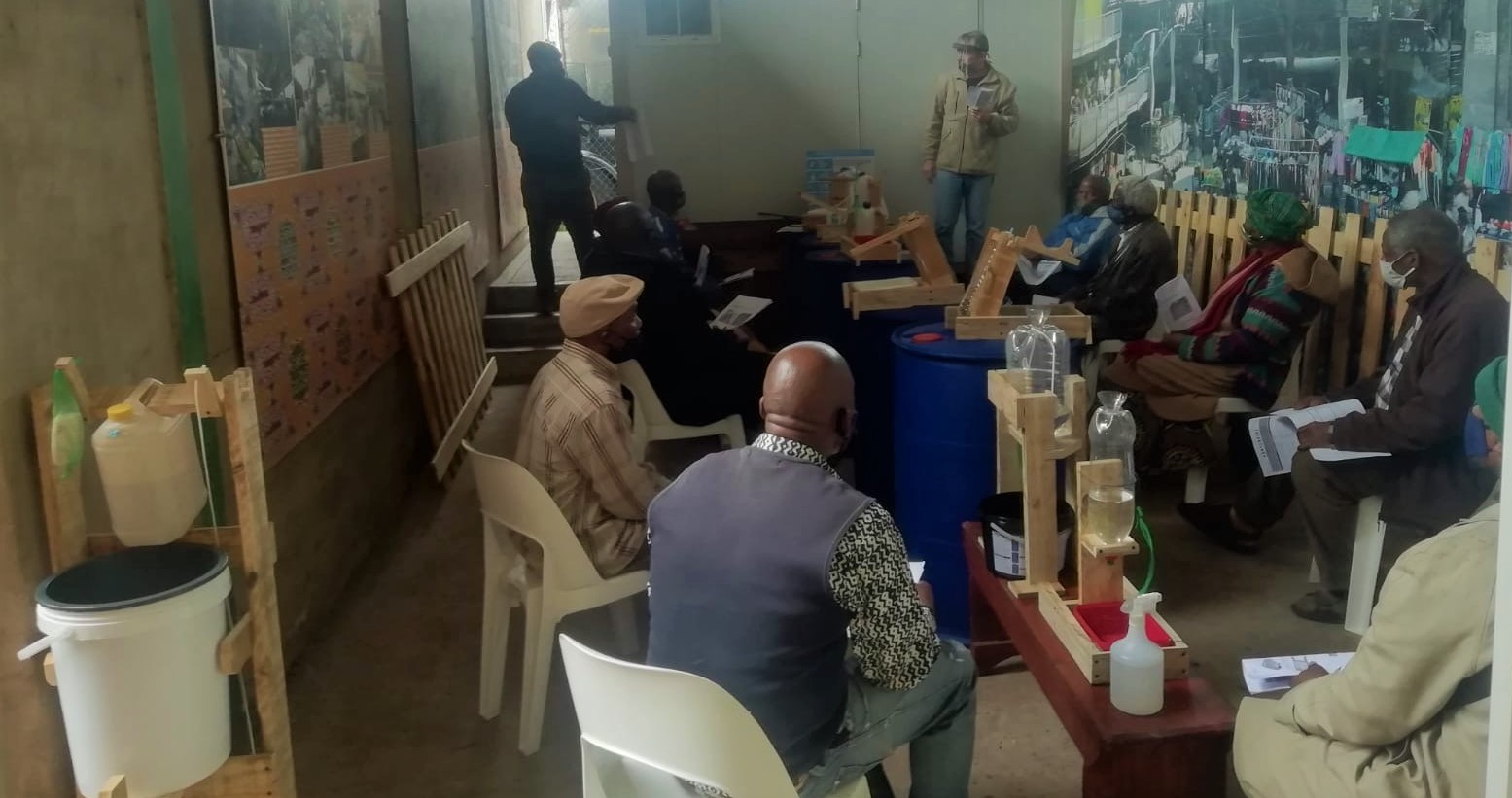Thuli Moyo
On the 18th June 2020, leaders of informal trading committees gathered for their regular Kanyenathi meeting. Kanyenathi (which means ‘with us’ in isiZulu) is an established community forum which gives traders the opportunity to formally engage with the City regarding infrastructure and maintenance issues in their places of work. Notwithstanding the absence of a City representative, it was an opportunity for leaders to engage to discuss COVID-19 health and safety, policy regulations and spatial implications, as well as test the Geza Izandla (‘wash your hands’) stations.
The meeting was facilitated by AeTs co-founders, Patrick Ndlovu and Richard Dobson, who provided an overview of the impact of COVID-19 on informality and the expected changes in the economic landscape. The discussion premised on three key areas outlined below, however a major challenge is to determine what initiatives will be undertaken by the municipality. This will determine what steps could be taken by the leadership to duly safeguard the interests of the traders and reduce risks of COVID-19 in public spaces.
Health
It is critical to maintain and comply with health guidelines both at home and at places of work. Unlike the formal sector where structured measures are outlined for health compliance, it is the duty of the trader to implement and maintain health and safety measures. It is vital to maintain physical distancing and frequently sanitize working spaces. Detailed health guidelines were distributed to the trader leaders in their resource pack.
Frequent hand washing is an effective measure to combat COVID-19 transmission however as there is a lack of running water in Warwick Junction, AeT has developed Geza Izandla (isiZulu for ‘wash your hands’) stations. The wash stations were presented at the meeting and seemingly appreciated by the traders in attendance.
Sanitization of money was also highlighted as a necessity to curb infection transmission due to exchange of money between traders and customers on the streets.

Trader leaders testing the Geza Izandla wash station to wash hands on arrival at the meeting. 
Resource pack for attendees which included: previous newsletter, health guidelines, build a wash station guidelines and 2 masks.
Public Space
Promulgation of the new regulations included compulsory wearing of masks in public spaces as well as physical distancing. AeT emphasised the importance of distancing and expanded on the definition of physical distancing of at least 2 meters, which is a very important measure to prevent the spread of COVID-19. An implication of this could be the consequential closure of stalls for compliance purposes. Ultimately, should the traders wait on the municipality to determine how this should be implemented, or should there be a trader-led initiative as it is leaders who know what is feasible for traders in their respective working spaces.
Examples of good practice were explained, such as in Ghana where a time-sharing system was implemented by traders utilizing differing coloured cards with colour-matching time schedules – in practice reducing the numbers to comply with health protocols. The role to be played by the leadership in fighting for amenable interventions that will work effectively for the traders and their challenges during this pandemic is crucial. Another example was Johannesburg, where traders re-marked their trading spaces in compliance with the physical distancing regulations.
At the time of the meeting, the Brook street public lavatories were inaccessible to the traders. This necessitates the urgency of meaningful engagement between the City and trader leadership on possible solutions.
Regulations
All these actions should translate into a regulatory response from the City and anticipate an amended legislative framework due to COVID-19, such as extended validity of permits, suspension of vending fees, and review of the allocations policy. The leadership should have the opportunity to engage and negotiate with the municipality on behalf of the traders on these issues, which must be contextualised within the changed trading environment.
Committee leaders expressed concern that the City is not doing enough to support informal workers during COVID-19 and in fact there has been an increase in stringent measures, for example permit enforcement, closure of sanitation facilities, no access to water and confiscation of Traders’ goods due to expired permits.
The leadership could utilise this opportunity and propose a cessation of rental payments at least for 3-months as a result of their financial loss. Further, there is a necessity to advocate for effective ongoing strategies by the municipality that consider the economic and health risks for informal workers, such as interim suspension of vending fees, physical distancing policies in allocation of trading stalls, provision of safer working spaces, sanitisation of working spaces, accessible water points, provision of PPE etc. As life returns to Warwick Junction trader leaders recognise the need to be proactive rather than reactive. Thus, there is a need to strategize and lead mitigating interventions, rather than wait on the City.
The next Kanyenathi meeting is planned for mid-July, where these matters will be addressed with a city representative. Click here to find out more about Kanyenathi.
[Feature image: The Kanyenathi meeting took place in AeTs courtyard to ensure good ventilation of the meeting space, as well as seating arranged according to physical distancing regulations]

